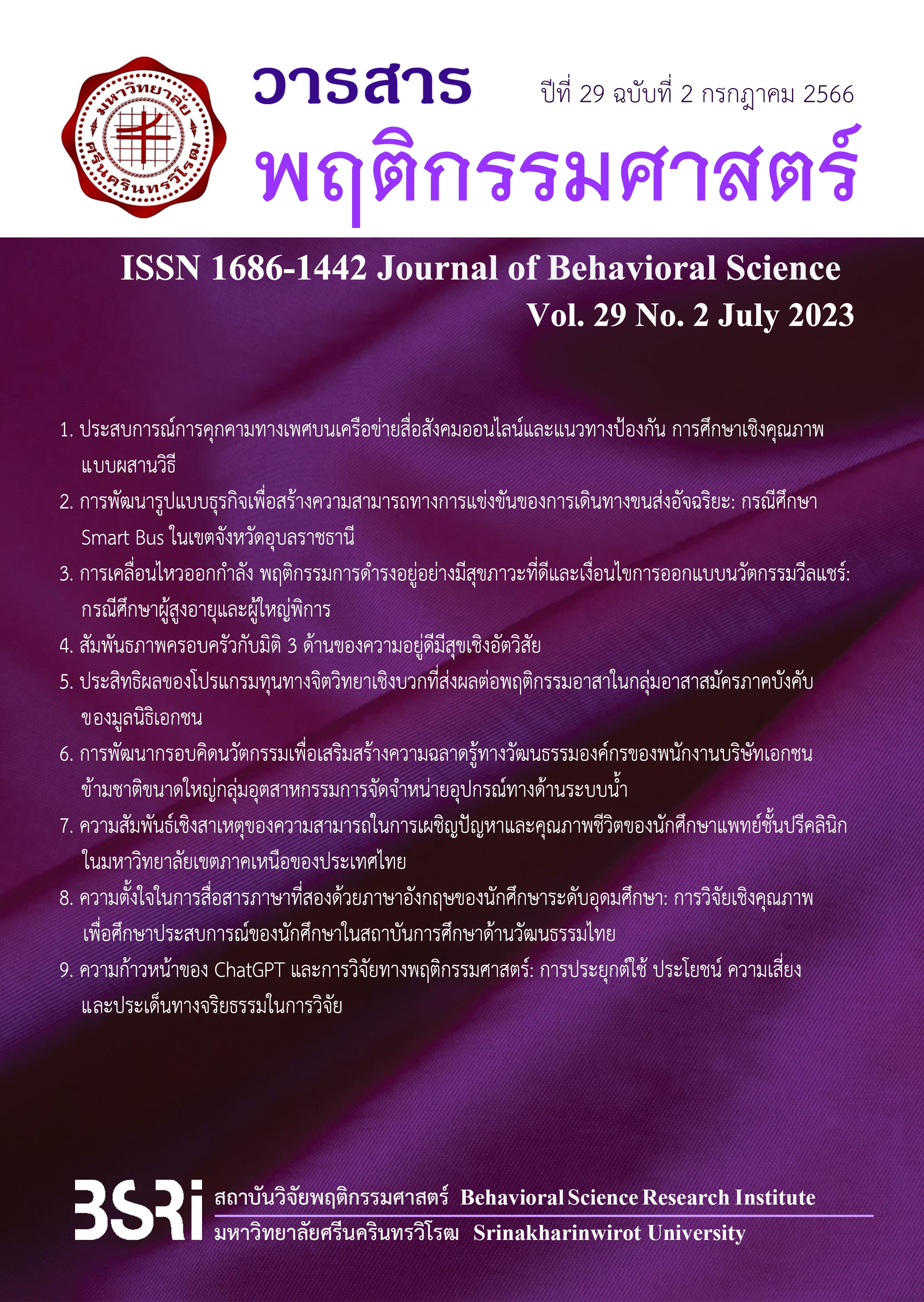Advances in ChatGPT and Behavioral Science Research: Applications, Benefits, Risks, and Ethical Issues in Research
Keywords:
ChatGPT, behavioral science research, prompt engineering, ethical issues in research, ChatGPT, Behavioral science research, Prompt engineering, Ethical issues in research, Artificial intelligenceAbstract
The advancement of ChatGPT, or artificial intelligence chatbots that provide automatic answering of various questions, has been gaining attention and trial until it became a topic of discussion and communication in society. It also affects human behavior, academic studies, and research in behavioral science. The author therefore presents this academic article to introduce the characteristics of ChatGPT and its use in behavioral science research that can help facilitate research work more conveniently, quickly, and efficiently, in addition to writing academic articles and research articles as generally known. ChatGPT is also useful for many other research applications, from starting to find research issues or problems, studying literature reviews, finding approaches to research, analyzing data, summarizing, and writing research reports. Prompt engineering is a key element in enabling ChatGPT to receive commands and respond accurately according to the user's needs. However, the use may be risky for users to consider due to the reliability and validity of the results, expenses and investment budget, user privacy, and especially ethical issues related to honesty and transparency in writing research reports that do not extract from ChatGPT responses to use in their own writings or make unethical inquiries, which pose a risk to both the user and general people in society. The adaptation and adoption of ChatGPT technology advancements are topics of future behavioral science research that should be explored.
Downloads
References
Abbott, J. A. (2023). A New Dawn, or the Sunset on Science? Artificial intelligence and JMIG, 30(5), 337-338. https://doi.org/10.1016/j.jmig.2023.02.020
Ancis, J. R. (2020). The age of cyberpsychology: An overview. Technology, Mind, and Behavior, 1(1). https://doi.org/10.1037/tmb0000009
Brown, T., Mann, B., Ryder, N., Subbiah, M., Kaplan, J. D., Dhariwal, P., Neelakantan, A., Shyam, P.,
Sastry, G., & Askell, A. (2020). Language models are few-shot learners. Advances in Neural Information Processing Systems, 33, 1877–1901.
Carlbring, P., Hadjistavropoulos, H., Kleiboer, A., & Andersson, G. (2023, April). A new era in Internet interventions: The advent of Chat-GPT and AI-assisted therapist guidance. Internet Interventions, 32, 100621. https://doi.org/10.1016/j.invent.2023.100621
Chaijukul, Y. (2013). Introduction to behavioral science. In Y. Chaijukul (Ed.), Behavioral Sciences from diverse perspectives (pp. 1-36). Behavioral science research institute, Srinakharinwirot University.
Eke, D.O. (2023). ChatGPT and the rise of generative AI: Threat to academic integrity? Journal of Responsible Technology, 13, 100060. https://doi.org/10.1016/j.jrt.2023.100060
Elsevier. (2023). Publishing Ethics. https://www.elsevier.com/about/policies/publishing-ethics
Gleason, N. (2022). ChatGPT and the rise of AI writers: How should higher education respond? https://www.timeshighereducation.com/campus/chatgpt-and-rise-ai-writers-how-should-higher-education-respond
Javaid, M., Haleem, A., & Singh, R. P. (2023, February). ChatGPT for healthcare services: An emerging stage for an innovative perspective. BenchCouncil Transactions on Benchmarks, Standards and Evaluations, 3(1), 100105. https://doi.org/10.1016/j.tbench.2023.100105
John, I. (2023). The Art of Asking ChatGPT for High-Quality Answers: A Complete Guide to Prompt Engineering Techniques. United States of America: Nzunda Technologies Limited.
McAdoo, T. (2023). How to cite ChatGPT. https://apastyle.apa.org/blog/how-to-cite-chatgpt
OpenAI (2023). Introducing ChatGPT. https://openai.com/blog/chatgpt
Paul, J., Ueno, A., & Dennis, C. (2023). ChatGPT and consumers: Benefits, Pitfalls and Future Research Agenda. International Journal of Consumer Studies, 1– 13. https://doi.org/10.1111/ijcs.12928
Pichai, S. (2023). An important next step on our AI journey. https://blog.google/technology/ai/bard-google-ai-search-updates
Radford, A., Wu, J., Child, R., Luan, D., Amodei, D., & Sutskever, I. (2019). Language models are unsupervised multitask learners. OpenAI Blog, 1(8).
Ruby, D. (2023). 30+ Detailed ChatGPT Statistics — Users & Facts. https://www.demandsage.com/chatgpt-statistics
Sun, Y., Wang, S., Li, Y., Feng, S., Chen, X., Zhang, H., Tian, X., Zhu, D., Tian, H., & Wu, H. (2019). Ernie: Enhanced representation through knowledge integration. arXiv preprint arXiv:1904.09223.
Tsai, M. L., Ong, C. W., & Chen, C. L. (2023, July). Exploring the use of large language models (LLMs) in chemical engineering education: Building core course problem models with Chat-GPT. Education for Chemical Engineers, 44, 71–95. https://doi.org/10.1016/j.ece.2023.05.001
UNESCO (2023). ChatGPT and artificial intelligence in higher education: quick start guide. https://unesdoc.unesco.org/ark:/48223/pf0000385146
Downloads
Published
How to Cite
Issue
Section
License
Copyright (c) 2023 Warasan Phuettikammasat

This work is licensed under a Creative Commons Attribution-NonCommercial-NoDerivatives 4.0 International License.
Behavioral Science Research Institute, SWU
114 Sukhumvit 23, Bangkok 10110, Thailand.
Tel.02-649-5000 # 17600



